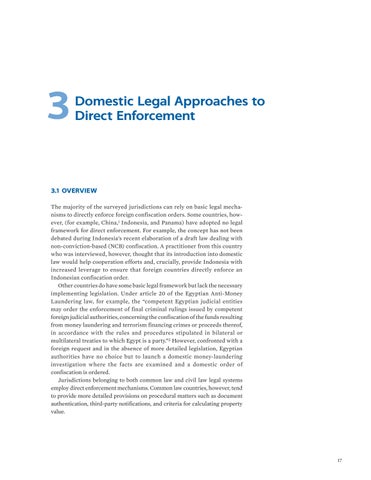3
Domestic Legal Approaches to Direct Enforcement
3.1 OVERVIEW The majority of the surveyed jurisdictions can rely on basic legal mechanisms to directly enforce foreign confiscation orders. Some countries, however, (for example, China,1 Indonesia, and Panama) have adopted no legal framework for direct enforcement. For example, the concept has not been debated during Indonesia’s recent elaboration of a draft law dealing with non-conviction-based (NCB) confiscation. A practitioner from this country who was interviewed, however, thought that its introduction into domestic law would help cooperation efforts and, crucially, provide Indonesia with increased leverage to ensure that foreign countries directly enforce an Indonesian confiscation order. Other countries do have some basic legal framework but lack the necessary implementing legislation. Under article 20 of the Egyptian Anti-Money Laundering law, for example, the “competent Egyptian judicial entities may order the enforcement of final criminal rulings issued by competent foreign judicial authorities, concerning the confiscation of the funds resulting from money laundering and terrorism financing crimes or proceeds thereof, in a ccordance with the rules and procedures stipulated in bilateral or multilateral treaties to which Egypt is a party.”2 However, confronted with a foreign request and in the absence of more detailed legislation, Egyptian authorities have no choice but to launch a domestic money-laundering investigation where the facts are examined and a domestic order of confiscation is ordered. Jurisdictions belonging to both common law and civil law legal systems employ direct enforcement mechanisms. Common law countries, however, tend to provide more detailed provisions on procedural matters such as document authentication, third-party notifications, and criteria for calculating property value.
17

